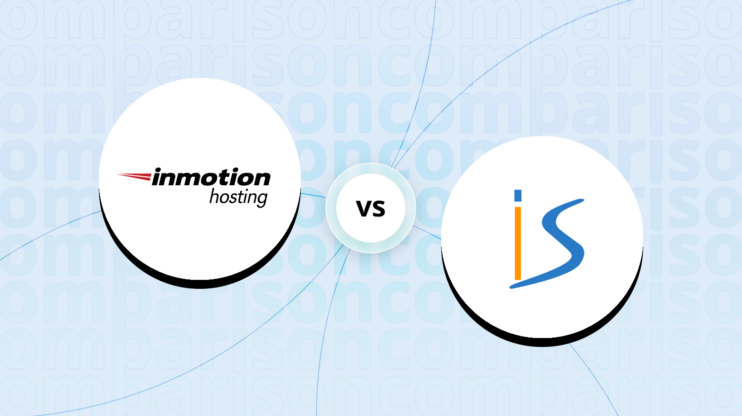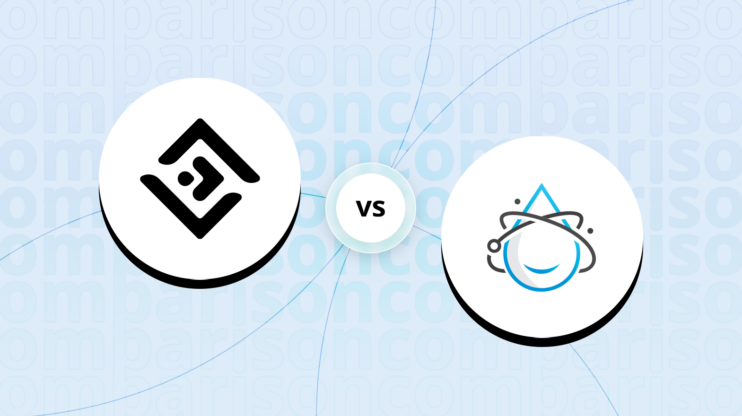Liquid Web vs StableHost: Final verdict
Looking over Liquid Web vs. StableHost, both web hosting services provide distinct advantages to their users based on their needs.
-
Liquid Web (Overall grade: 8.7)
excels in managed hosting solutions, offering a range of high-performance hosting types, including cloud and dedicated hosting. With robust uptime guarantees and advanced monitoring systems, it ensures minimal downtime and swift problem resolution. The platform’s high availability features make it ideal for high-traffic and specialized websites. Liquid Web also stands out with its compliance in various regulatory needs, diverse security measures, and exceptional scalability. While it comes at a higher price point, the extensive features and strong customer support justify the investment for businesses looking for reliability and comprehensive solutions.
StableHost (Overall grade: 6.9)
offers a budget-friendly hosting option with a focus on shared and eCommerce hosting. It provides reliable uptime and clustered hosting to eliminate single points of failure. While it lacks some of the higher-end features and server types of Liquid Web, it compensates with solid performance for smaller projects or users with basic requirements. Its user-friendly interface and various automated tools make it accessible even for those without technical expertise. However, its limited scalability and enterprise-level support might not suit larger, growing businesses. Overall, StableHost is a strong, cost-effective choice for personal sites and small businesses.
 Overall grade:8.7 |
 Overall grade:6.9 |
|
|---|---|---|
| Uptime and Availability | 9.4 | 9.0 |
| Hosting Performance | 8.5 | 7.2 |
| Hosting Security | 9.0 | 8.5 |
| Price | 8.4 | 8.4 |
| Hosting Features | 7.9 | 5.9 |
| Ease Of Setup | 9.3 | 8.2 |
| User Management | 7.8 | 0.0 |
| Customer Support | 9.6 | 7.6 |
| User feedback | 4.3/5 | 4.8/5 |
Hosting types offered
Both platforms provide a variety of hosting types, each designed to meet the different needs of users.
 |
 |
|
|---|---|---|
| Shared hosting | ||
| Cloud hosting | ||
| WordPress hosting | ||
| Ecommerce hosting | ||
| VPS hosting | ||
| Dedicated hosting |
Although both offer a variety of hosting plans tailored to different needs, in certain cases, one platform may prove to be more suitable.
Detailed comparison
Uptime and availability
Evaluates the average uptime statistics, uptime guarantee and overall availability of the hosting
provider
Score Components:
- Uptime percentage (30%): evaluates the uptime statistics in given period of time
- Uptime guarantee (20%): Assesses if the platform offers an uptime guarantee and
whether the actual uptime matches the promised guarantee. - General performance (25%): Evaluates how fast is the average response time and overall
it’s stability. - Responsiveness (10%): Adaptability to different devices and screen sizes.
- Availability (25%): Reflects the total downtime and number of outages.
 9.4
9.4
 9.0
9.0
🏆 Winner Liquid Web: Unmatched uptime and availability for seamless online experiences.

Liquid Web stands out with its comprehensive uptime solutions. Offering 100% network and power uptime SLAs, customers can expect an uninterrupted online presence. Their proactive Sonar™ Monitoring and 30-minute hardware SLA ensure swift problem resolution, providing peace of mind. Additionally, Liquid Web’s high availability hosting and managed services minimize downtime, creating a reliable hosting environment.

StableHost also delivers strong performance with a 99.9% uptime guarantee. They ensure reliable service through clustered hosting, which eliminates single points of failure. The company provides rapid response times and a 45-day money-back guarantee, highlighting their commitment to customer satisfaction. Despite these strengths, Liquid Web’s higher uptime guarantee and advanced support systems make it the better choice for maximum reliability.
Which one has better hosting performance?
Score Components:
- Hosting speed (30%): This includes SSD quality, Load times, PageSpeed score ranges,
additional information on website speed, built-in plugins for performance enhancement, available caching
methods, and CPU/RAM options - CDN (20%): Considers whether CDN is available or not, whether it’s free or paid, and
the quality of the CDN service - Available data centers (30%): Evaluates the number of data centers and their locations
globally. - Scalibility (20%): Looks at whether elastic scaling is available, the process required
to scale (manual upgrade vs. automatic scaling), the presence of dedicated servers, and the costs
associated with scaling.
 8.5
8.5
 7.2
7.2
🏆 Winner:
Liquid Web: Offers a wide range of high-performance hosting options and outstanding customer support.
When evaluating general performance, Liquid Web stands out with its optimized VPS plans using AMD EPYC processors, NVMe or SSD storage, and impressive 10 Gbps network speeds. It offers high availability through multi-server environments and both managed WordPress and WooCommerce hosting with efficient caching methods and CDN. With data centers located globally, Liquid Web ensures minimal latency. On the other hand, StableHost provides SSD drives, unlimited bandwidth, and clustered DNS through its data centers in Phoenix, Chicago, and Amsterdam. It also supports LiteSpeed web servers and automatic node failover.
Website speed
Liquid Web’s website speed is enhanced by AMD EPYC processors, NVMe storage, and a 10 Gbps network. Managed WordPress and WooCommerce hosting include image compression and Cloudflare-powered CDN to further boost performance. In contrast, StableHost leverages customized LiteSpeed, PHP, and MySQL, along with a 200 Gbps network capable of handling traffic spikes efficiently. Both provide solid solutions, but Liquid Web offers slightly better overall speed optimization and traffic management features.
Scalability
Liquid Web supports easy scalability across its VPS, WordPress, WooCommerce, and cloud dedicated servers. It offers auto-scaling for managed WooCommerce hosting during high traffic periods, with dedicated servers boasting up to 128 GB RAM and 16 cores. The scaling process is straightforward with root access provided. On the other hand, StableHost offers automatic IO re-allocation and load balancing but lacks the detailed information on dedicated server options or cost of scaling. Liquid Web’s clear scalability benefits and available options edge it ahead in this area.
Which one has better security features?
and regulatory requirements
Score Components:
- Technical security measures (40%): This includes encryption, firewalls, DDoS
protection, secure configurations, server monitoring, access control and availability of security addons
(e.g Sitelock security). - Operational security measures (30%): Encompasses data privacy, backups and data
redundancy. - Compliance and certifications (20%): Adherence to legal and regulatory requirements
(e.g., GDPR, HIPAA) and possession of certifications (e.g., ISO 27001, SOC 2). - Business and reliability (10%): Factors in the provider’s reputation, uptime
guarantees, and customer support.
 9.0
9.0
 8.5
8.5
🏆 Winner Liquid Web: Offers robust security measures and comprehensive regulatory compliance solutions for sensitive data handling.
Technical security measures:
Liquid Web provides extensive security features including SSL certificates, firewalls, DDoS protection, intrusion detection systems, and web application firewalls. It offers multiple PHP versions to suit various applications. StableHost also provides SSL certificates, VPN services, and daily backups, along with PHP support ranging from 7.x to 8.x. Both providers ensure encrypted data with their SSL offerings. However, Liquid Web’s more advanced protective features, such as real-time DDoS attack protection and the F5 AIP Intrusion Detection System, give it a slight edge.
Operational security measures:
Liquid Web’s operational security includes manned facilities, closed circuit TV security cameras, and electronic perimeter access card systems. It supports real-time monitoring and offers a high-availability network. StableHost, on the other hand, provides 24/7 server monitoring, virus/spam filtering, and security audits with extended penetration testing and VPN services. While both offer robust operational security, Liquid Web’s physical security measures alongside 24/7 on-site support and manned data centers enhance its overall security posture.
Compliance and certifications:
Liquid Web meets various regulatory requirements, including GDPR, HIPAA, and PCI, positioning it as a versatile option across different industries. It holds multiple certifications like SSAE-22 and Safe Harbor Compliance. StableHost complies with GDPR, supports PCI standards, and provides Personal Data Assistance Agreements, but lacks explicit HIPAA compliant services. Liquid Web’s wider range of compliance and certifications makes it more favorable for enterprises with stringent security needs.
 |
 |
|
|---|---|---|
SSL certificate |
Yes |
Yes |
Additional security features |
Firewalls, DDoS, Intrusion Detection |
VPN, Security Audits, Virus/Spam Filtering |
PHP versions |
Multiple (Not specified) |
PHP 7.x and 8.x |
GDPR compliance |
Yes |
Yes |
HIPAA compliance |
Yes |
Not specified |
PCI compliance |
Yes |
Yes |
Hosting features
Score Components:
- Domains (20%): Assesses the availability of a free domain, domain purchase options, and
pricing - Email (15%): Considers if the provider offers full email hosting, or is reselling
third-party service, and if the email is only transactional or not - Website builder (15%): Checks if website builder is available, and it’s user
friendliness and overall the level of customization allowed. - Staging environment (20%): Determines if a staging environment is available, allowing
for testing changes before going live. - FTP & SFTP accounts (10%): Evaluates if and how easily users can access FTP and
SFTP accounts - Git and SSH access (20%): Assess whether Git is integrated into the hosting service and
if SSH access is provided
 7.9
7.9
 5.9
5.9
🏆 Winner Liquid Web: Offering fully managed, high-performance, and compliant hosting solutions, Liquid Web stands out as the top choice in this comparison.
Both Liquid Web and StableHost provide an array of features designed to cater to diverse hosting needs. Liquid Web excels with its fully managed hosting that includes proactive management, security updates, and 24/7 support. It also offers high availability hosting and compliant solutions like HIPAA and PCI, making it ideal for users with specific regulatory needs. Additionally, Liquid Web supports various hosting environments such as VMware Private Cloud, Managed VPS Hosting, Windows Hosting, and Managed WooCommerce and WordPress Hosting. Tools for website development include access to Plesk and cPanel, which facilitate user-friendly site management experiences. On the other hand, StableHost offers a practical and straightforward setup with unlimited FTP accounts, a site builder through Site.Pro, and Softaculous for easy script installations. It focuses on budget-conscious users needing SSD storage and SSH access at an additional fee.
Key differences emerge in their service configurations. Liquid Web’s dedicated high-availability setup, proactive monitoring, and managed solutions provide an edge for enterprises and websites requiring intensive resources and reliability. StableHost, however, is effective for smaller projects or users seeking a cost-efficient solution with essential features like unlimited MySQL databases and daily backups using R1Soft. This tailored offering ensures that both novice and experienced users can find their suitable match, whether they need high-end managed hosting with Liquid Web or a simplified, budget-friendly option with StableHost.
 |
 |
|
|---|---|---|
| Free domain | No | No |
| Free SSL | Yes | Yes |
| Email hosting | Yes | Yes |
| Website builder | No | Yes |
| Staging environment | Yes | No |
| FTP & SFTP accounts | Yes | Yes |
| Git and SSH access | Yes | Yes (SSH for a fee) |
| Free backup | Yes | Yes |
| Money back guarantee | No | No |
Both providers support a range of users from beginners to experts with user-friendly website builders and WordPress staging areas. However, in terms of developer tools, both Liquid Web and StableHost offer robust options including SSH access, support for multiple programming languages, and Git for version control, thus appealing to developers looking for advanced capabilities.
Email services:
Liquid Web and StableHost both provide robust email hosting services. Liquid Web includes unlimited email accounts as part of its managed hosting plans, supporting various business needs like custom domains and mail forwarding. StableHost also offers unlimited email accounts, forwards, auto responders, and mailing lists, enhancing versatility in setting up email campaigns. Both providers incorporate virus and spam filtering, but Liquid Web integrates these within its broader security offerings, while StableHost focuses on more standalone, user-friendly email features.
Price
Score Components:
- Plan value (40%): What each pricing tier offers.
- Transparency and clarity (30%): Clearness of pricing structures.
- Flexibility of plans (20%): Range of options to suit different budgets.
- Hidden costs (10%): Additional expenses not included in the plan.
 8.4
8.4
 8.4
8.4
🏆 Winner Liquid Web: Offering extensive managed hosting plans with powerful features suited for businesses of all sizes.
Evaluating the pricing of plans among various hosting providers can be complex due to their differing pricing and renewal strategies. Additionally, certain plans require annual commitments, which adds to the difficulty of making comparisons. The prices listed are based on monthly commitments; plans requiring annual commitments are indicated. Additionally, although some providers offer identical plans for WordPress and shared hosting, we have created separate tables for each to enhance clarity.
When comparing the pricing plans of Liquid Web and StableHost, it’s evident that both providers cater to a range of hosting needs. Liquid Web offers comprehensive managed WooCommerce, WordPress, VPS, and dedicated server hosting with features that scale up significantly at higher tiers. Conversely, StableHost’s plans focus more on affordability, offering cost-effective shared and VPS hosting options with unlimited resources. Liquid Web’s dedicated support and high scalability for businesses handling large traffic volumes stand out, while StableHost’s budget-friendly plans attract smaller projects and personal sites.
 |
 |
|---|---|
|
SPARK$21/mo
1 site, 15GB storage, 2TB bandwidth, SSL, 24/7 support, 10 PHP workers, WordPress optimized. Value for price:7.5
|
Starter$8.59/mo
1 site, unlimited storage, unlimited bandwidth, SSL, 24/7 support, WordPress optimized, free website builder. Value for price:8.2
|
|
SPARK+$43/mo
3 sites, 25GB storage, 2.5TB bandwidth, SSL, 24/7 support, 15 PHP workers, WordPress optimized. Value for price:7.8
|
Pro$15/mo
Multiple websites, unlimited storage, unlimited bandwidth, SSL, 24/7 support, WordPress optimized, free website builder. Value for price:8.3
|
|
MAKER$47.85/mo initially, then $87/mo
5 sites, 40GB storage, 3TB bandwidth, SSL, 24/7 support, 20 PHP workers, WordPress optimized. Value for price:8.0
|
Platinum$38.99/mo
Large websites, unlimited storage, unlimited bandwidth, SSL, 24/7 support, WordPress optimized, VIP support. Value for price:8.4
|
|
DESIGNER$54/mo initially, then $120/mo
10 sites, 60GB storage, 4TB bandwidth, SSL, 24/7 support, 20 PHP workers, WordPress optimized. Value for price:8.2
|
N/A
|
|
BUILDER$73.80/mo initially, then $164/mo
25 sites, 100GB storage, 5TB bandwidth, SSL, 24/7 support, 30 PHP workers, WordPress optimized. Value for price:8.4
|
N/A
|
|
PRODUCER$147.60/mo initially, then $328/mo
50 sites, 300GB storage, 5TB bandwidth, SSL, 24/7 support, 40 PHP workers, WordPress optimized. Value for price:8.6
|
N/A
|
|
EXECUTIVE$270.90/mo initially, then $602/mo
100 sites, 500GB storage, 10TB bandwidth, SSL, 24/7 support, 50 PHP workers, WordPress optimized. Value for price:8.9
|
N/A
|
|
ENTERPRISE$492.75/mo initially, then $1095/mo
250 sites, 800GB storage, 10TB bandwidth, SSL, 24/7 support, 60 PHP workers, WordPress optimized. Value for price:9.2
|
N/A
|
 |
 |
|---|---|
|
N/A
|
Mini$1.50/mo
1 site, 5GB storage, 500GB bandwidth, 3 email accounts, SSL, 99.9% SLA, sitebuilder. Value for price:8.0
|
|
N/A
|
Starter$10.59/mo
1 site, unlimited storage, unlimited bandwidth, SSL, 24/7 support, unlimited email accounts, free website builder. Value for price:8.5
|
|
N/A
|
Pro$15.99/mo
Unlimited sites, unlimited storage, unlimited bandwidth, SSL, 24/7 support, unlimited email accounts, free website builder. Value for price:8.6
|
|
N/A
|
Platinum$40.99/mo
Unlimited sites, unlimited storage, unlimited bandwidth, SSL, 24/7 support, VIP support, WordPress optimized. Value for price:8.4
|
 |
 |
|---|---|
|
ESSENTIAL$20/mo
1 site, 40GB storage, 10TB bandwidth, SSL, 24/7 support, 2GB RAM, 2 vCPU. Value for price:7.4
|
VZ 1GB$10.95/mo
1 site, 40GB storage, 2TB bandwidth, SSL, 24/7 support, 1 GB RAM, 1 Core CPU, 1000Mbit. Value for price:7.8
|
|
ADVANCED$30/mo
1 site, 100GB storage, 10TB bandwidth, SSL, 24/7 support, 4GB RAM, 4 vCPU. Value for price:7.9
|
VZ 2GB$16.30/mo
1 site, 60GB storage, 2TB bandwidth, SSL, 24/7 support, 2 GB RAM, 2 Core CPU, 1000Mbit. Value for price:7.9
|
|
PROFESSIONAL$40/mo
1 site, 150GB storage, 10TB bandwidth, SSL, 24/7 support, 8GB RAM, 8 vCPU. Value for price:8.3
|
VZ 4GB$32.95/mo
1 site, 100GB storage, 4TB bandwidth, SSL, 24/7 support, 4 GB RAM, 4 Core CPU, 1000Mbit. Value for price:8.5
|
|
ELITE$50/mo
1 site, 200GB storage, 10TB bandwidth, SSL, 24/7 support, 12GB RAM, 12 vCPU. Value for price:8.5
|
VZ 8GBN/A
1 site, 200GB storage, 8TB bandwidth, SSL, 24/7 support, 8 GB RAM, 6 Core CPU, 1000Mbit. Value for price:8.6
|
|
Intel Xeon E-2356G$159/mo
Linux, 6 cores, 3.2 GHz (5.0 GHz turbo), 480GB SSD RAID-1, 10TB bandwidth. Value for price:8.7
|
VZ 16GBN/A
1 site, 300GB storage, 16TB bandwidth, SSL, 24/7 support, 16 GB RAM, 8 Core CPU, 1000Mbit. Value for price:8.8
|
Enterprise plans
Liquid Web provides tailored plans with managed security, databases, load balancers, and disaster recovery, ensuring top-tier support for large businesses. StableHost offers competitive reseller and VPS hosting plans that can theoretically be scaled for enterprise needs but lacks the extensive enterprise-focused services that Liquid Web affords. Liquid Web is more suited for businesses looking for dedicated enterprise features.
Liquid Web vs StableHost: Ease of setup
platform.
Score Components:
- Site migration (25%): Assesses whether the provider offers tools for site migration,
either automated or manual, and whether these services are free or require a fee. - Admin panel usability (35%): Evaluates the type of admin panel provided, such as the
standard cPanel or a custom solution, focusing on its accessibility and user-friendliness for both
technical and non-technical users. - Setup features (20%): Examines the availability and ease of use of various setup
features, including FTP accounts, file managers, email account setup, PHPMyAdmin, and easy CDN
configuration. - Help center quality (20%): Measures the quality and accessibility of the provider’s
help center resources, including articles and tutorials.
 9.3
9.3
 8.2
8.2
🏆 Winner Liquid Web: Liquid Web offers user-friendly managed hosting solutions with comprehensive support and resources.
Liquid Web provides a variety of control panels, including InterWorx, Plesk, and WHM/cPanel, making it accessible for both technical and non-technical users. These control panels come with easy-to-use interfaces that streamline server and website management. Additionally, the Managed WordPress Hosting offered by Liquid Web simplifies site management with automatic plugin updates and proactive monitoring. Conversely, StableHost uses cPanel for shared and reseller servers and SolusVM for VPS hosting, both of which are designed to be user-friendly. They also offer Site.Pro Web Builder for those preferring a drag-and-drop interface, appealing to users without coding knowledge.
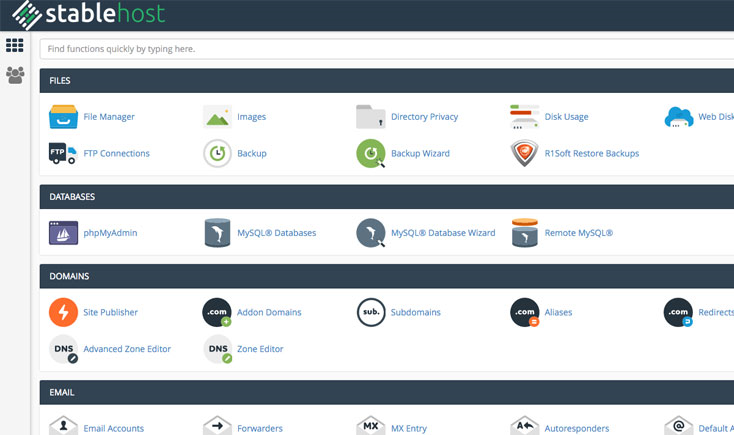
When it comes to migration tools, Liquid Web sets itself apart with complimentary migrations for new server orders across most hosting control panels like InterWorx, Plesk, and cPanel. This service alleviates the technical burden on users during the migration process. StableHost also facilitates migrations but doesn’t specify whether the service is complimentary, potentially leading to additional costs for the user.
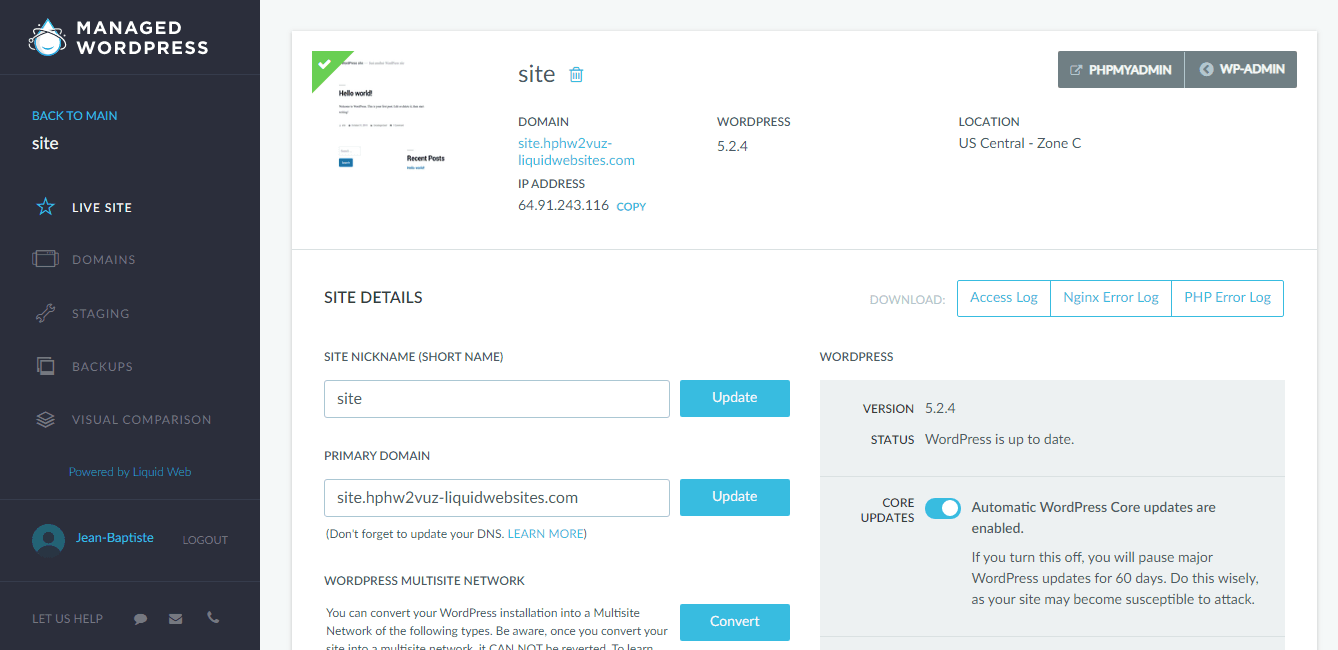
Both hosting providers have strong help center resources. Liquid Web’s Knowledge Base is comprehensive, covering a wide range of topics with articles, tutorials, and step-by-step solutions. They also guarantee rapid initial responses via phone, chat, and helpdesk tickets. StableHost’s Help Center is also extensive, featuring articles and guides on various topics, and offers 24/7 support with a notably quick response time.
The platforms provide extensive knowledge bases filled with guides, how-to articles, and instructional content. Liquid Web offers a wide range of resources alongside 24/7 chat and phone support. StableHost also boasts a detailed help center with an intuitive search function and around-the-clock support via live chat, phone, and ticketing, ensuring comprehensive user support.
User management
accessibility.
Score Components:
- Role customization (40%): Flexibility in creating and defining user roles and
permissions. - Ease of management (30%): User interface and tools for managing users.
- Access control (20%): Effectiveness of access control measures for different user
levels. - Scalability (10%): Ability to manage a growing number of users efficiently.
 7.8
7.8
 0
0
🏆 Winner Liquid Web: Liquid Web provides an extensive suite of user management features in Plesk that cater well to various administrative needs.
Liquid Web offers detailed user role management capabilities within Plesk, allowing for the creation, modification, and removal of user accounts in both Service Provider and Power User views. The platform supports four default user roles: Administrator, Webmaster, Application User, and Accountant. This versatility in user roles allows administrators to finely tune permissions and responsibilities. In contrast, StableHost does not provide specific information about user role management, making it challenging to compare directly. Therefore, Liquid Web stands out for its flexibility in defining and managing user roles and permissions.
Liquid Web’s user interface in Plesk is designed for ease of use, providing clear pathways for accessing user management features. In the Service Provider view, user accounts and roles are easily accessible via the Subscriptions page and Users tab. The Power User view simplifies this by presenting a list of user accounts directly from the main menu. The intuitive design ensures administrators can quickly navigate and manage user settings. Unfortunately, the lack of detailed information on StableHost’s user interface for managing user accounts makes it harder to assess its user-friendliness compared to Liquid Web’s Plesk interface.
For managing access control and handling a growing number of users, Liquid Web offers robust tools within Plesk. Administrators can create additional administrator accounts, ensuring effective delegation and streamlined management. The specificity of roles and permissions means each user has clearly defined access, reducing the risk of unauthorized actions. Without detailed insights into StableHost’s capabilities, it’s difficult to judge their effectiveness in this area. Liquid Web’s approach seems more geared towards scalability and efficient user management.
Liquid Web User Roles Table:
| Role | Description | Access Highlights |
|---|---|---|
| Administrator | Full access to the Plesk control panel and server management functions. | Can manage all aspects of the server, including creating user accounts and defining roles. |
| Webmaster | Manages subscriptions, including creating new sites and configuring services. | Cannot create new Plesk users or manage roles; limited to managing DNS, mail, and FTP settings. |
| Application User | Limited access to specific services and applications. | Restricted actions within designated applications and services provided by the subscription. |
| Accountant | Views subscription details without the ability to modify settings. | Read-only access to subscription information, useful for auditing and account management. |
Customer support
hosting provider.
Score Components:
- Support communication channels (30%): Measures the variety of customer support types
provided (live chat, chatbot, email, phone, etc.) - Availability (20%): Assesses the availability hours for each channel, including 24/7
support options. - Technical support quality (30%): Assesses whether the provider offers comprehensive
technical support, including hardware upgrades (e.g., HDD to SSD), software installations, and web
server configuration changes. - Enterprise support (20%): Checks if there are dedicated or priority support services
for enterprise-level customers.
 9.6
9.6
 7.6
7.6
🏆 Winner
Liquid Web: Offers the most responsive and dedicated customer support.
 |
 |
|
|---|---|---|
Phone support |
||
Live chat support |
||
Chatbot |
||
Email/ticket support |
||
Enterprise support |
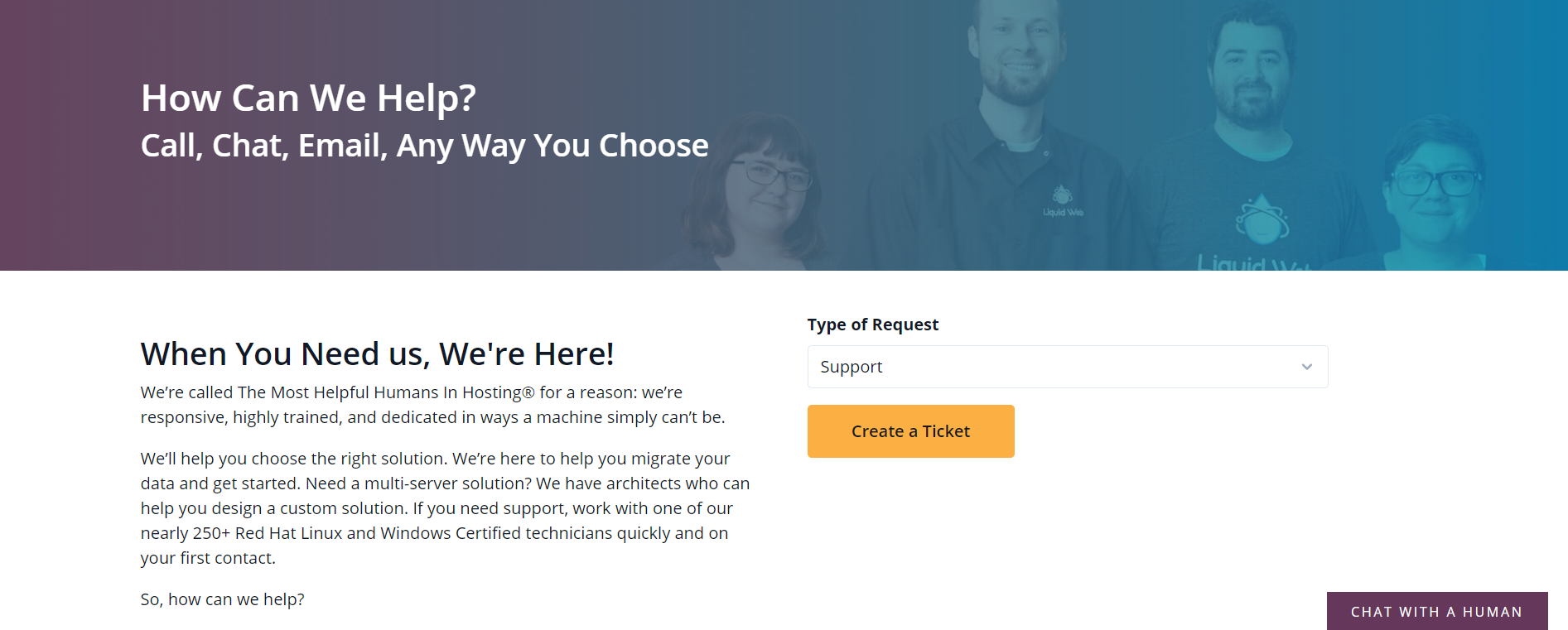
Liquid Web provides an extensive customer support system, boasting a 59-second initial response time for phone and chat and a 59-minute initial response guarantee for helpdesk tickets. Their support is available 24/7/365 and includes highly trained, certified technicians, specialized managed hosting advisors, and dedicated account executives. Liquid Web also has a high Net Promoter Score (NPS) of 67, indicating a strong customer satisfaction level.

StableHost offers a simpler support structure with 24/7 technical support and sales and billing support available 9 AM – 5 PM (MST). While it provides phone, email, and live chat support, it lacks the dedicated enterprise support and specialized teams that Liquid Web offers. This limited support structure is reflected in their lower NPS and overall user satisfaction score.
Liquid Web vs StableHost: User feedback
User feedback for the hosting provider is highly polarized. Many long-term customers highlight a significant decline in service quality, stating that the once-excellent customer support and reliability have deteriorated dramatically, causing frequent outages, slower load times, and unresponsive support. These users express frustration over questionable billing practices and ill-informed technical help, urging others to avoid the provider. On the other hand, some users praise the company for its proactive, knowledgeable, and prompt support, emphasizing excellent uptime and reliability. These contrasting reviews suggest a mixed experience, with some users experiencing severe service issues while others remain highly satisfied.
StableHost receives high praise for its reliable performance and excellent customer support, often described as prompt and helpful. Users appreciate its ease of integration, comprehensive setup guides, and rich feature set, making it an ideal choice for both novice and advanced users. While some advanced users find certain functionalities lacking and note higher pricing compared to budget-friendly options, the overall consensus is positive due to its strong uptime and user-friendly interface. The plans are seen as reasonably priced, especially with available discounts, though some users miss the immediate tech support response times of the past.
Liquid Web vs StableHost: FAQ
Which platform is better suited for hosting WordPress websites?
Both Liquid Web and StableHost are well-suited for hosting WordPress websites. Liquid Web offers managed WordPress hosting with advanced optimizations, higher performance, and security measures. StableHost provides a budget-friendly option with solid performance and unlimited storage. Therefore, both platforms are effective, but Liquid Web offers more premium features ideal for larger sites.
Which hosting service offers better security features?
Liquid Web provides more extensive security features, including SSL certificates, firewalls, DDoS protection, intrusion detection systems, and web application firewalls. It also meets various regulatory requirements such as GDPR, HIPAA, and PCI compliance. While StableHost offers SSL certificates, VPN services, and daily backups, it lacks the advanced protective features found in Liquid Web.
What are the major differences in pricing and value between liquidweb and stablehost?
Liquid Web’s plans are more expensive but come with comprehensive managed services and higher performance features suitable for businesses. StableHost offers cost-effective shared and VPS hosting options with unlimited resources, targeting budget-conscious users and smaller projects. Overall, Liquid Web’s plans cater to businesses needing robust support and scalability, while StableHost focuses on basic, affordable hosting.
Which hosting service offers more scalability options for growing websites?
Liquid Web supports easy scalability across its VPS, WordPress, WooCommerce, and cloud dedicated servers, with auto-scaling for managed WooCommerce hosting and powerful dedicated servers. StableHost offers automatic IO re-allocation and load balancing but lacks detailed information on extensive scalability. Liquid Web’s clear scalability benefits and detailed options make it better suited for growing websites.
How do the providers handle email hosting and what features are included?
Both Liquid Web and StableHost offer robust email hosting services with unlimited email accounts. Liquid Web includes custom domains and mail forwarding within its managed hosting plans, integrated within its broader security offerings. StableHost provides versatile email features like forwards, auto-responders, and mailing lists. However, Liquid Web integrates these email services with its extensive security measures, enhancing overall reliability.
The making of this blog
We followed a clear, step-by-step process to write and research this article.










